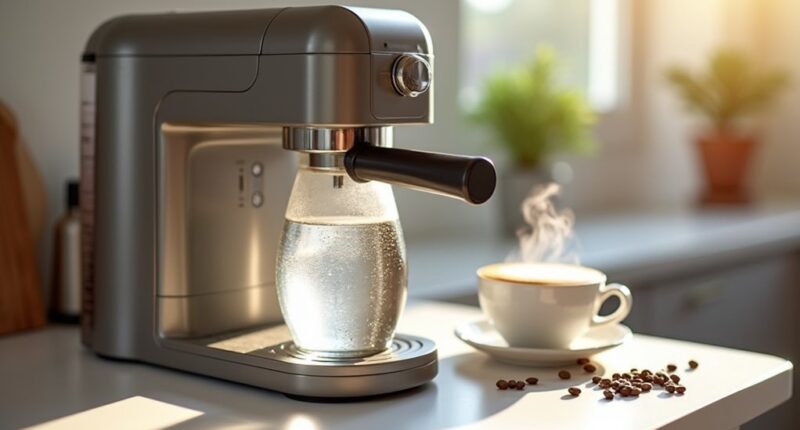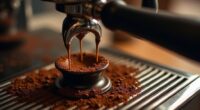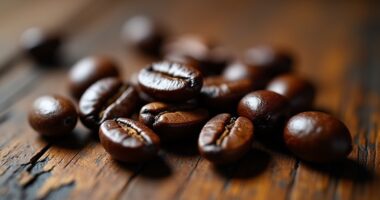Using distilled water in your coffee maker might sound like a clean idea, but it can seriously mess with your brew’s flavor. Without essential minerals, your coffee can taste flat or even sour! Plus, distilled water can corrode your machine over time, leading to costly repairs—yikes! You want your coffee to be rich and flavorful, right? Stick to mineral-rich water for a better cup. Am I right? Let’s chat about what works best for your coffee!
At a Glance
- Distilled water lacks essential minerals, leading to flat or sour coffee taste and weak flavor profiles.
- Using distilled water increases corrosion risk in coffee makers, potentially damaging internal components.
- Distilled water can leach metal ions, causing pitting and reducing the lifespan of coffee machines.
- Misconceptions exist that distilled water enhances flavor, but it often results in bitter brews and dissatisfaction.
- Economic factors include higher energy costs for distillation and potential expensive repairs from using distilled water.
Impact on Coffee Taste and Extraction
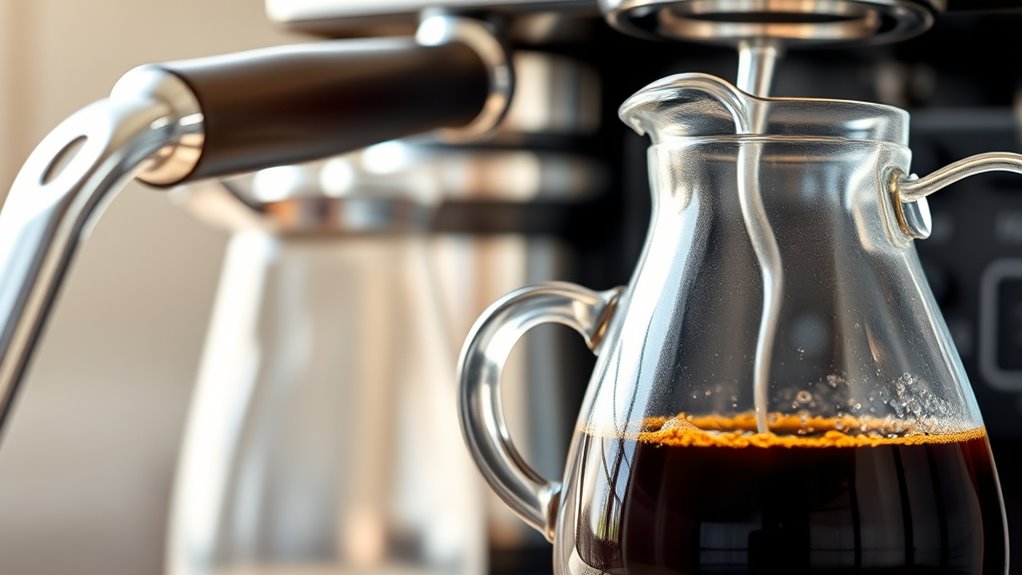
Have you ever wondered why your coffee sometimes tastes like a weak hug instead of a warm embrace?
It could be the distilled water you’re using! This pure water lacks essential minerals like calcium and magnesium that boost extraction efficiency.
Without these minerals, your coffee’s taste profile can end up flat or sour, leaving you craving that rich flavor.
Think about it: a mineral-rich brew can give you that balanced sweetness and body you love.
So, ditch the distilled water and embrace something with a bit more personality.
Your taste buds will thank you for the glorious coffee experience! Additionally, using mineral-rich water can enhance the overall flavor profile and result in a more satisfying cup.
Effects on Coffee Maker Equipment
When you decide to use distilled water in your coffee maker, you might unknowingly be inviting some trouble into your brewing buddy’s life!
Distilled water lacks those friendly minerals, which can ramp up corrosion risk. Over time, it’ll leach metal ions from your machine, leading to pitting and weak spots. Nobody wants a coffee maker that’s falling apart, right?
Plus, without minerals, your machine might overheat or give false “empty reservoir” signals. This can seriously shorten your equipment’s lifespan. Additionally, using proper storage techniques for your coffee can enhance flavor and prevent waste.
Misconceptions About Distilled Water
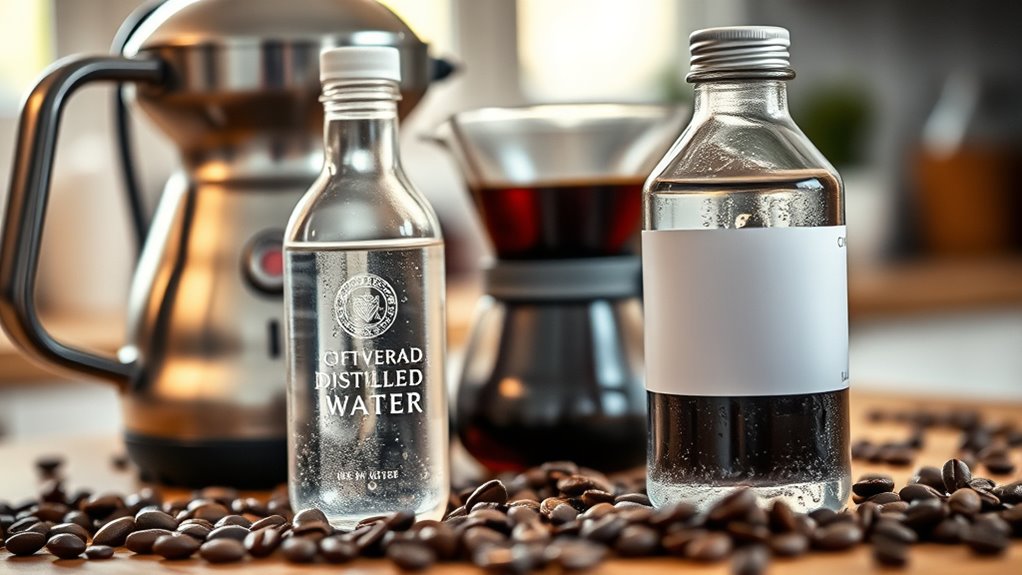
Using distilled water in your coffee maker might seem like a no-brainer, but there are some pretty wild misconceptions floating around about it. For instance, many think distilled water enhances coffee flavor, but it can actually create bitter brews due to low mineral content. Plus, some folks believe it won’t damage your machine, but it can corrode parts over time! Additionally, using distilled water can negatively affect the extraction process, as coffee brewing requires certain minerals for optimal flavor. Check out this table to debunk some common distilled water myths:
| Myth | Reality | Impact |
|---|---|---|
| It enhances flavor | Often flat taste | Bitter brews |
| Safe for machines | Can cause corrosion | Equipment damage |
| Leaches body minerals | No effect | Misunderstanding |
Comparison With Filtered and Tap Water
While you might think all water is created equal, the truth is that choosing between filtered water, tap water, and distilled water can make a big difference in your coffee game.
Filtered water is like your coffee’s best friend, keeping those essential minerals that enhance flavor profiles.
Tap water can be a wild card, with tastes changing based on your water sources. Hard water might make your coffee bitter, while soft water can taste flat.
Distilled water? It’s pure but lacks depth, leaving your brew feeling underwhelming. Additionally, using proper coffee storage techniques can help maintain the quality of your coffee, ensuring that its flavor is not compromised by stale beans.
Economic and Environmental Considerations
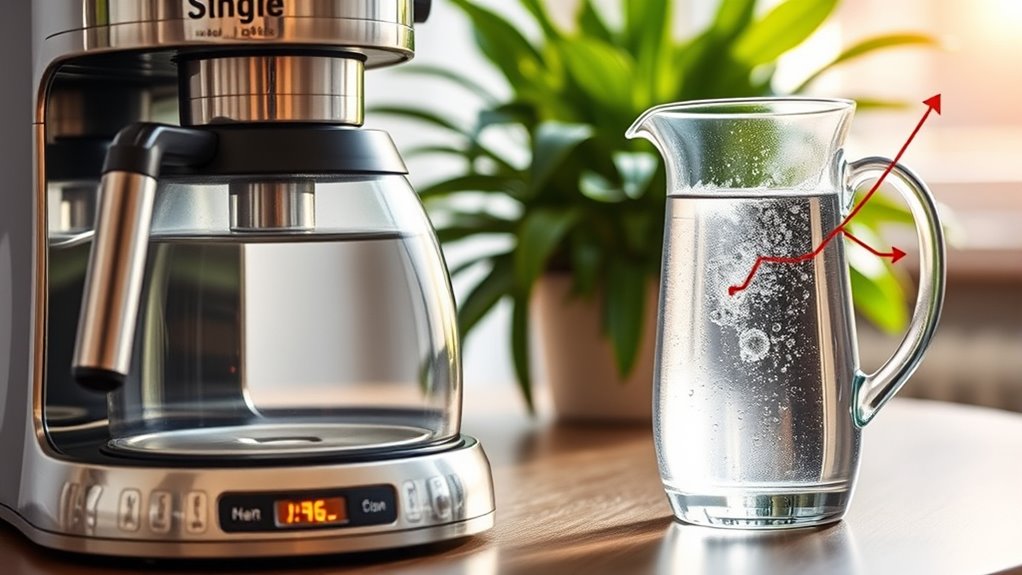
If you’ve ever crunched the numbers on your coffee habit, you know that the choice of water can hit your wallet harder than you’d think.
Think about it:
- Distillation costs more in energy usage, cranking up those household expenses.
- Bottled distilled water adds to plastic waste—who needs that?
- Corrosion from distilled water can lead to pricey coffee maker repairs.
- Using high-quality materials in your coffee equipment can help minimize maintenance costs and extend the lifespan of your appliances.
